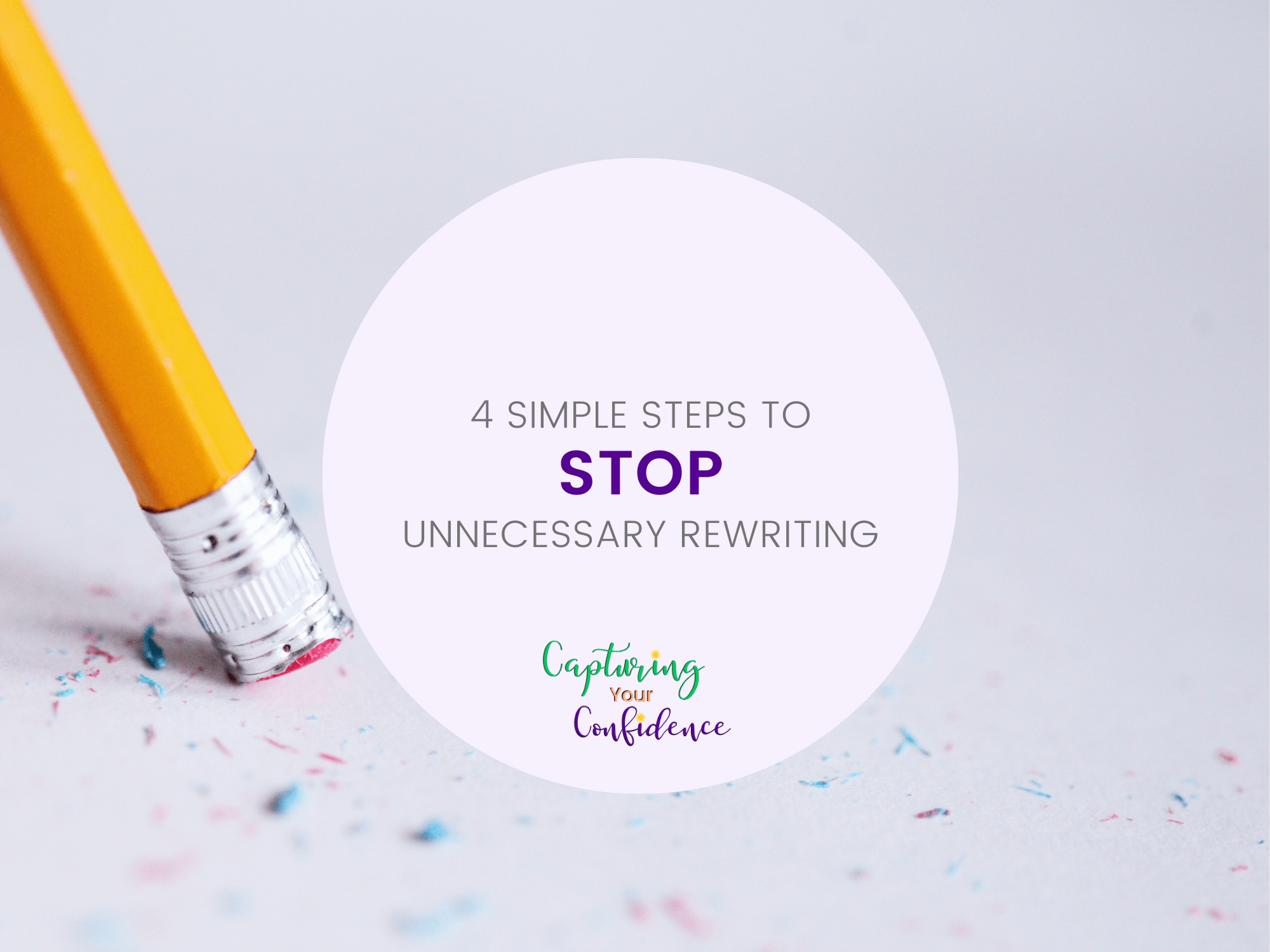4 Simple Steps to Stop Unnecessary Rewriting
You’ve written and edited a beautifully detailed scene, and because you know yourself, you’ve taken a few days off to get some critical distance.
You come back and to your utter horror, you hate it.
Every. Single. Detail.
You scrap it and rewrite it, feeling assured that this time was definitely better!
You come back the next day and groan. It’s just as bad as the first time!
The crumpled drafts are piling up and you are so sick of looking at this dang scene! You throw something on the page haphazardly and slam your laptop shut with frustration.
Does this sound familiar?
For many writers, it’s hard to be completely satisfied with our words, even when they’re supposed to be “done” or close to done. We get into a cycle of rewriting on repeat until our brain feels like it’s going to explode.
It’s not fun, is it?
The good news is, you can teach yourself to stop rewriting so many times.
What do I Mean by Rewriting?
Before we dig in to how to solve the rewriting issue, I wanted to clarify what I mean by rewriting because some people use it differently.
What I mean when I say rewrite is one of two things:
You’ve gotten rid of or decided not to use all of a piece of writing. For example, an entire 10-page scene from the draft of a book
You’ve kept the main idea of a piece of writing, but reconfigured how it actually reads. For example, a chapter about love started out as a nasty divorce but now reads as a first conversation about the possibility of ending a marriage.
Rewriting is a big deal because it takes a lot of time and effort - it’s not just sentence level editing.
Why do we Rewrite?
We don’t just rewrite because it’s fun, right? Because most of the time it’s really not that fun.
In my experience, there are 3 main reason writers do serious rewriting:
Needs Improvement - Sometimes our writing just wasn’t that great the first time around. It - needs to be better, clearer, more descriptive - something just needs to be better.
There are legitimate reasons to rewrite, like this one. Rewriting is part of the writing process, honestly, because we can’t possibly be great every first draft we do. The problem becomes when we obsess over being perfect, not when we’re actually working to make our writing better.
Not Satisfied with Words - The most common reason I hear for major rewriting is because a writer isn’t satisfied with what they’ve written for some reason or another.
Many times it’s not even because the writing itself is bad or needs significant improvement. It’s because the words on the page don’t reflect exactly what the writer imagined, so instead of taking some distance and getting fresh eyes, they throw away their work and start over.
Perfectionism - I talk a lot about being a recovering perfectionist, which is only relevant here because it comes up so much with rewriting. Everyone wants their words to be amazing!
No one is perfect, though. The idea that our words could truly be perfect if we just keep rewriting only serves to slow us down from the real progress we could be making with editing and adding new good material.
If this sounds like something you do (I know I’ve struggled with this, especially before getting feedback!), here’s what you can do.
4 Simple Steps to Stop Unnecessary Rewriting
Take a Breath - Before you put your hands on your keyboard (or on your printed manuscript), take a deep breath. Think about this exact moment in time and what you’re about to do. Consider why you want to rewrite (or rewrite again in many cases).
Give Your Document One Last Look - Read through your words, even if you’ve decided you hate them. Look at what’s actually on the page and note what you don’t like about them. Really consider why you want to rewrite this section and how long that might take. Make notes about it, if that will help you process.
Close the Document or Put the Document in Your Drawer - Without erasing anything, or throwing anything in the trash can, put that bad boy away! If you’re prepared to completely erase your hard work and have your finger poised over the delete button, stop yourself right now and put it back where it came from.
Do NOT Open that Document or Drawer Until It’s Time to Work Again - When it’s time for your next writing session, and not a minute before, get that writing out and look at the notes you made. See if there’s anything you can add, or if there are things you can move around rather than rewriting the whole piece.
Taking some time away from this writing, especially if you hate it, will help you make a calmer, more collected decision rather than an emotional spur of the moment choice you might regret later.
Next Steps
I’m not saying there’s never a time to scrap pieces of writing - some of it can be bad. Like, embarrassing bad. But you can almost always improve something rather than spending your time continuing to start over and over again. It will probably be less frustrating that way, too!
The question is, what to do with this information?
Admit to yourself that you may have a problem with rewriting. You don’t have to tell anyone if you don’t want to, but in order to train yourself to stop, you need to acknowledge that you have an issue with rewriting too many times.
Decide that your best is enough. This is key: YOUR BEST IS GOOD ENOUGH. That’s not to say you won’t need editing, because you probably will - everyone does; but your words that express your ideas are good enough the way you write them. You can always clarify and add to your heart’s content, but you need to decide for yourself that you and your effort are good enough to stop constantly rewriting.
Decide to put the draft away for a while. This is probably the hardest part. You need critical distance away from your writing - it’s important to the writing process. When you’re excited or close to finishing a section, it can be really hard to put it down and walk away, especially if you feel like you could rewrite the piece quickly. Be brave and make the decision to put that draft away and take a break for a little bit.
Get assistance with how to rewrite more effectively when you’re ready to go back to your project (or start a new one). One of the difficult parts about writing is that it’s largely solitary. We create these worlds from our mind but we do it alone!
If you’re stuck, or you just want a friendly face to help keep you accountable (and boost your confidence so you can kick rewriting’s butt), I can help. I work with writers on this all the time because it’s hard! Doing it alone can make it harder, so why not enlist help? Click here to read more about how we can work together and get you on the right track.
My challenge to you is to take a long hard look at why you’re rewriting so much and decide to tackle it so you can move on with your project.
How do you handle rewriting? Are you stuck in the perpetually rewriting loop? Have you escaped the loop using another idea? I’d love to hear about your experiences! Find me on social media, drop a comment below, or email me at rachel@capturingyourconfidence.com!
Let’s chat because you, my friend, are on your way to great writing.





